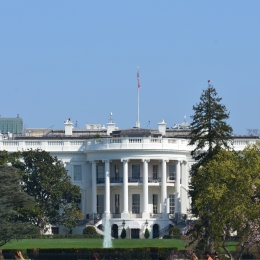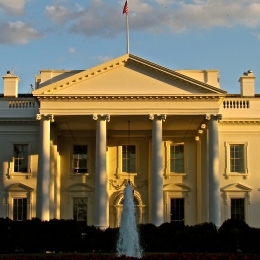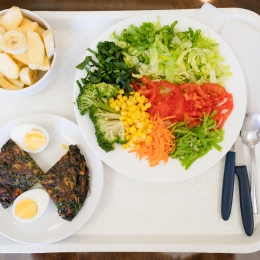Government food purchasing and service: Model policies and examples
The different types of policy mechanisms
- Legislation includes federal laws, state laws, and local ordinances passed by the legislative body in the jurisdiction. To be changed, the legislature must vote to amend or repeal the law.
- Executive order is a binding decree made by the executive authority (e.g., a state governor) of a jurisdiction that directs a government entity or entities to operate in a certain way. The executive can unilaterally change or rescind an executive order at any time.
- Internal agency-level policy is a formal, written policy internal to a government agency (e.g., the Department of Corrections) that is considered mandatory but does not carry the force of law. These policies address agency food procurement, and are distinct from agency exercises of regulatory power through rulemaking and guidance.
- Resolution is a formal statement of the legislative body in the jurisdiction. Resolutions are not legally binding if passed.
We strongly recommend pursuing a legally binding mechanism, including legislation or executive order (see model below), to provide the necessary authority to enact and sustain a values-aligned food purchasing and food service policy. We provide examples of legally binding and non-binding mechanisms on this page. Much of the language in each example can be adapted for other mechanisms.

Model Policy
Healthy, Values-Aligned Food Service Guidelines (2024)
This CSPI resource includes customizable templates for a state bill and executive order that can easily be adapted for local government as well. Both model policies establish state food standards based on the Dietary Guidelines for Americans, require all state food service settings to follow the state food standards, and require state agencies to participate in the GFPP.

Model Policy
Template Good Food Purchasing Policy (n.d.)
This is a template resolution from the Center for Good Food Purchasing for a government or public institution to adopt the GFPP. Feel free to draw from this language based on what’s most relevant to your circumstances. Please note this content is based on previously adopted GFPP policies and lessons gleaned from trusted partners also working within procurement to affect systemic change.
View Healthier Food on State and Local Property map in a new tab
This map shows, to CSPI’s knowledge, which states, cities, and counties have adopted a nutrition policy and/or values-aligned purchasing policy for foods purchased, served, or sold by public institutions or on public property. They include legislation, resolutions and motions of legislative bodies, executive orders, and administrative policies. Policies specific to K-12 schools are not shown here. This information was not collected systematically. If we’re missing a policy, please let us know at policy@cspinet.org.
Select Local, State, and Federal Policy Examples
Below are examples of local, state, and federal food purchasing and food service policies that are either comprehensive in reach (apply to all agencies that purchase food or all facilities that serve food in that jurisdiction) or apply to food service settings that serve dependent populations, such as hospitals and correctional facilities. They vary in the values they address—some address only nutrition or sustainability, while several address all five values of the Good Food Purchasing Program.
Examples
- Vermont Nutrition procurement standards (29 V.S.A. §160c)(2016): The Vermont State Legislature passed this law requiring all foods purchased, sold, or served by any State entity to meet nutrition procurement standards established by the Commissioner of Health.
- Boston, MA., Municipal Code § 4-9. Requiring City Department and Vendors to Adopt Good Food Purchasing Standards (March 20, 2019): The Boston City Council passed this ordinance requiring city departments and vendors to adopt and implement the GFPP. It established a time frame during which city agencies would cooperate with a baseline assessment and develop multi-year action plans to measure success toward Good Food Purchasing Standards. The ordinance includes provisions to ensure transparency and community engagement. This case study describes the advocacy and policy development process for this ordinance.
- S.F., CA., Admin. Code § 21D. Food Purchases at Hospitals Operated by the Department of Public Health and Jails Operated by the Sheriff's Department (August 21, 2020): The San Francisco Board of Supervisors passed this ordinance requiring the city’s Sheriff’s Department and Department of Public Health participate in the GFPP.
- Washington D.C., Code § 8-151.09b. Greenhouse gas emissions in food and beverage procurement (July 29, 2021): The District of Columbia Council passed this law to enable the District to reduce greenhouse gas emissions associated with food procurement. Among other provisions, the law requires the DC Department of Energy and Environment to establish a baseline assessment of greenhouse gas emissions associated with the District’s food and beverage purchases, establish best practices for reducing emissions associated with such purchases, and to reduce overall emissions associated with food procurement according to a reduction schedule.
- County of Los Angeles Motion by Supervisor Mark Ridley-Thomas: Healthy Food Promotion in LA County Food Services Contracts (March 8, 2011): The Los Angeles County Board of Supervisors adopted this motion instructing county departments to consult with the Department of Public Health prior to the release of any requests for proposals for county food services contracts to incorporate nutrition recommendations.
- County of San Diego, California Board of Supervisors Policy B-75: County of San Diego Sustainable, Equitable, and Local Food Sourcing Policy (December 5, 2023): The San Diego County Board of Supervisors adopted this policy to support a sustainable, equitable, and local food system through County of San Diego food service programs and operations by directing public funds to food and beverage purchases that align with the following value categories: local sourcing, equity-informed sourcing, elevated labor standards, organic or regenerative certification, low-carbon intensity, and nutritional co-benefit.
- Chicago City Council Resolution: Adoption and implementation of Good Food Purchasing Standards (September 6, 2017): The City of Chicago adopted this resolution encouraging city departments and agencies to adopt and implement the GFPP.
- Cook County Board of Commissioners Resolution to Adopt the Good Food Purchasing Policy (May 16, 2018): Cook County, Illinois adopted this resolution tasking county departments and agencies with adopting and implementing the GFPP.
- Alameda County Board of Supervisors Resolution Adopting the Good Food Purchasing Policy and the Good Food Purchasing Pledge (January 26, 2021): Alameda County, California adopted this resolution directing the Sheriff’s Office and Probation Department to implement the GFPP and encouraging other county agencies to participate in the Good Food Purchasing Pledge.
- New York City Executive Order No. 122: Food Policy Coordinator for the City of New York and City Agency Food Standards (September 19, 2008): New York City Mayor Michael Bloomberg issued this executive order directing the Health Department to develop science-based Food Standards and directing all City agencies to follow the Food Standards for all meals that are purchased, prepared, served, or contracted for by the agency.
- New York City Executive Order No. 8: Commitment to Health and Nutrition: Food Standards and Good Food Purchasing (February 10, 2022): Replacing Mayor Bloomberg’s Executive Order 122, New York City Mayor Eric Adams issued this executive order reaffirming the city’s commitment to the Food Standards and directing the Mayor’s Office of Food Policy to establish a Good Food Purchasing Program. Additional information about the implementation and evaluation of the Standards can be found in this 2023 compliance report.
- Massachusetts Executive Order No. 509: Establishing nutrition standards for food purchased and served by state agencies (January 7, 2009): Governor Deval Patrick issued this executive order requiring every state agency to ensure that it purchases and provides food meeting nutrition standards established by the Department of Public Health.
- City of Los Angeles Executive Directive No. 24: Good Food Purchasing Policy (October 24, 2012): City of Los Angeles Mayor Antonio R. Villaraigosa issued this executive directive for all City departments with food purchases of greater than $10,000 annually to adopt the Good Food Purchasing Pledge and initiative plans to follow the Good Food Purchasing Guidelines. This landmark policy was the first local adoption of what is now known as the GFPP.
- Philadelphia Executive Order 4-14: Establishing Nutrition Standards for Food and Beverages Purchased, Prepared, or Served by City Agencies (June 11, 2014): City of Philadelphia Mayor Michael Nutter issued this executive order directing the Health Commissioner to develop nutrition standards for City Agencies and made the nutrition standards mandatory for all city contracts.
- Washington State Executive Order 13-06: Improving the Health and Productivity of State Employees and Access to Healthy Foods in State Facilities (October 30, 2013): Washington State Governor Jay Inslee issued this executive order directing all state agencies to adopt and implement a policy ensuring the provision of healthful foods and beverages in all food venues that meets the Washington State Healthy Nutrition Guidelines. Learn about the development and adoption of this policy in this case study.
- Executive Order No. 149: City and County of Denver’s Good Food Purchasing Program (March 14, 2022): Denver Mayor Michael Hancock issued this executive order directing city departments and agencies offering public meal programs and concessions to implement the GFPP.
- Food Service Guidelines in CDC-Owned Or -Operated Dining and Vending Facilities (January 11, 2018): The purpose of this policy is to ensure all new and renegotiated food service contracts and permits meet the standards outlined in the current Food Service Guidelines for Federal Facilities. It applies to Requests for Proposals and approved contracts or permits that secure qualified vendors to provide food service in Centers for Disease Control and Prevention-owned or -operated dining and vending facilities in the United States or its territories.
- National Park Service Healthy Food Choice Standards and Sustainable Food Guidelines for Front Country Operations (June 15, 2017): The Healthy Food Choice Standards apply to new contracts for concession services in sites owned by the National Park Service. They require concessioners to meet minimum requirements for healthy menu options, food preparation practices, and education and labeling. The voluntary Sustainable Food Choice Guidelines inform the procurement and labeling of more sustainable food choices, including sustainable seafood; fair trade coffee; organic foods; seasonal, locally or regionally produced foods, and animal products raised without added hormones or antibiotics. Learn more about the development and implementation of this and other federal agency initiatives in this report from the Federal Good Food Purchasing Coalition.
- Department of Defense Menu Standards (August 26, 2022): The Department of Defense (DoD) Menu Standards inform menu offerings in appropriations-funded DoD dining facilities. Created by the DoD Nutrition Committee, these standards outline an extensive list of requirements to provide nutritionally sound meals. Each food group has a specified serving size, variety, preparation method, and nutrient requirements. Learn more about the development and implementation of this and other federal agency initiatives in this report from the Federal Good Food Purchasing Coalition.
The latest
New York State passes bill to transform public food purchasing
Food Service

DC Council bill falls short of needed improvements to jail food
Government Accountability

How the Biden administration can transform food in federal facilities for millions of people
Government Accountability

Biden administration makes progress toward hunger and nutrition commitments but major items still outstanding
Government Accountability

Incarcerated people deserve healthy meals and a balanced diet
Government Accountability

Tags
Topics

